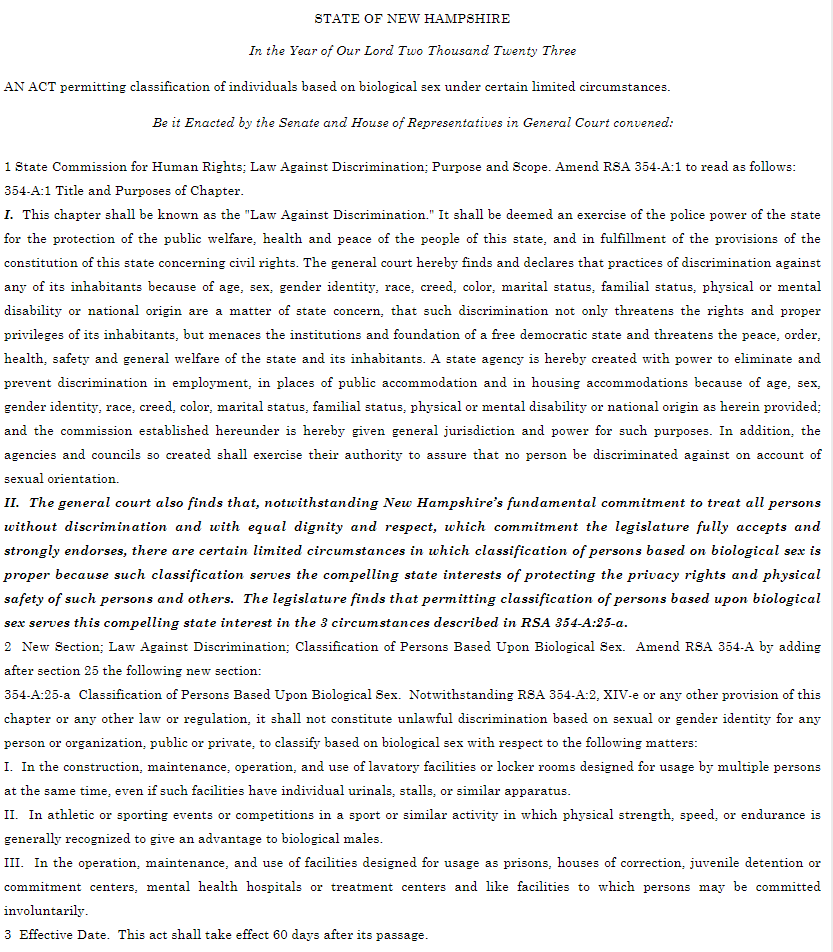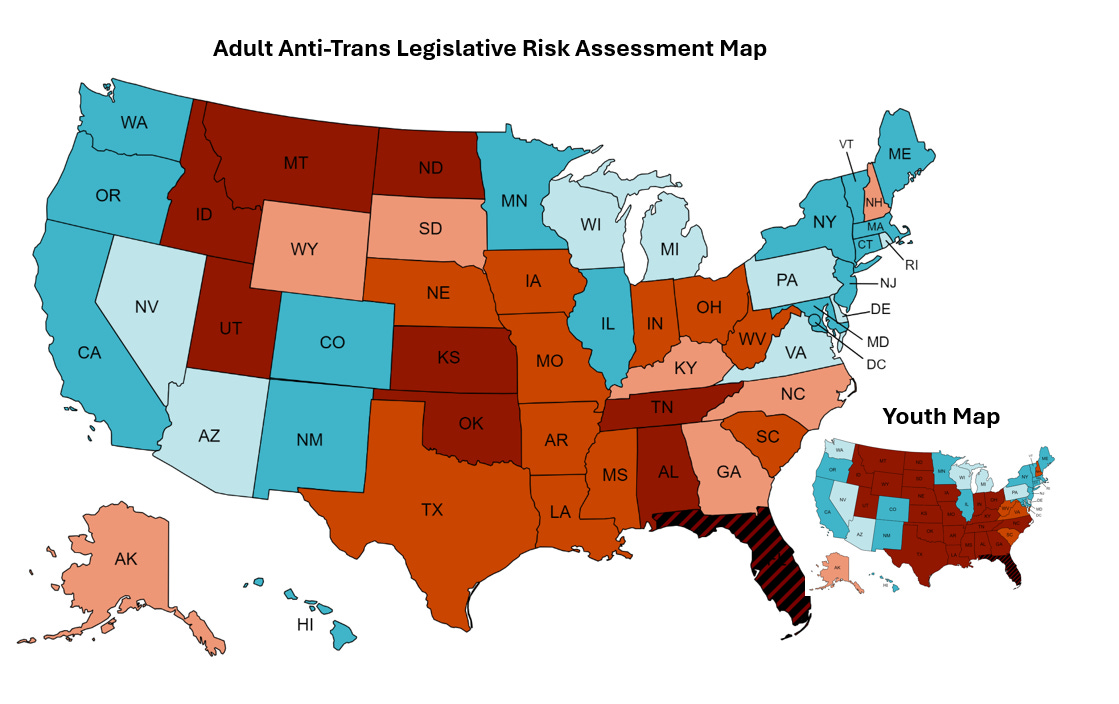New Hampshire
New Hampshire council moves to ban all art after LGBTQ mural
Town board has also taken aim at local theatre company production of La Cage Aux Folles, the 1983 Tony Award-winning musical

By Rob Salerno | LITTLETON, N.H. – Picturesque Littleton, New Hampshire frequently ranks near the top of lists of the best or most quintessential small towns in America, thanks to its bustling main street, fine dining options, and local arts scene.
But the anti-LGBTQ animus of the town’s small Board of Selectmen is threatening to destroy that hard-won reputation, and it’s all because of a small mural celebrating diversity installed on the side of a Chinese restaurant.
This summer, North Country Pride, which hosts an annual Pride Festival in the town, collaborated with local artists and the United Way to install the murals. While the artwork generated mostly positive feedback from the community, they have led the three-person board to consider banning all public art.
“Are we the county in Footloose?” says Kerri Harrington, one of the organizers of North Country Pride. “It’s frightening and kind of humorous.”

Board member Carrie Gendreau, a conservative Republican who is also a state Senator, first complained about the murals at a town board meeting in August. Gendreau elaborated to The Boston Globe that she believes “homosexuality is an abomination” and explained that she follows to the writings of doomsday cultist Jonathan Cahn.
Among Cahn’s fringe theories is a belief that rainbows are demonic symbols that power the ancient Mesopotamian goddess Ishtar, who wants vengeance on Christianity for marginalizing her.
The board, which leans conservative even though the town voted nearly 50-50 Biden-Trump in 2020, wanted to ban all LGBT art, but found that there wasn’t a way they could do that without running afoul of anti-discrimination and free speech laws. So instead, the board announced they would consider banning all art in public places.
As soon as the bans were floated, Harrington says she contacted the ACLU of New Hampshire, which is now monitoring the town in case the ban is put into law.
The proposal has understandably created tension and division in the small town. The September meeting where the ban proposal was first discussed drew 300 people – from a town of just over 6000 – to speak against it.
Although the ban has not advanced, Harrington says groups opposed to it are ensuring that 25 to 30 people attend all monthly town board meetings to ensure that board doesn’t try to introduce it without notice.
“People are upset,” Harrington says. “People are starting to say, ‘Well, I don’t want to visit your town.’”
The murals aren’t the only queer art in the town board’s sights.
A local production of the classic gay musical La Cage Aux Folles in the town Opera House has also been the target of attempted censorship by the town board.
The 1983 Tony Award-winning musical by Jerry Harmon and Harvey Fierstein tells the story of a gay couple who own a drag nightclub and try to pretend to a be a straight couple when their son becomes engaged to the daughter of a conservative politician. It was adapted into the 1996 film The Birdcage.
Theatre UP President Courtney Vashaw says the company was inspired to put on La Cage after far-right protestors disrupted a drag queen story hour at the local library.

“It was very ugly. White supremacists were getting involved, 80-year-old librarians were being threatened in their homes. We thought, how can we bring voice to this issue in a way that was palatable to the North Country public?” Vashaw says.
Vashaw says the company was told the board wanted to cancel the production, but it was unable to do so because the company had a contract with the town-owned Opera House. But the city general manager has told them that the board may block the company’s contract when it comes up for renewal in May.
“When we first heard that Carrie [Gendreau] was speaking out about the LGBTQ artwork, we knew that it was also about us. The fact that it was still part of the conversation was kind of gut-wrenching,” she says.
The town board’s antipathy to the company may also directly cause Littleton to lose a multi-million-dollar infrastructure investment. The company has secured grants and donations to build a new home, but is now reluctant to go ahead in Littleton.
“We have millions of dollars that we are looking to invest in a community performing space. Right now, there’s no way we’re making a commitment to partner with the town of Littleton,” Vashaw says.
Despite the threats from the city, the company pressed ahead with its show, which opened last Friday.
“We didn’t know what to expect going in. We had police presence in case things got weird, but the outpouring of love and support was absolutely magnificent,” she says.
Vashaw says that the controversy has actually helped drive attention to the theatre, with the first three shows being completely full houses – a rarity for most small-town theatres.
“This whole crazy issue has been both a blessing and a curse. It has brought people to the theatre that we don’t know if we would have gotten otherwise,” she says. “That’s what makes it worth doing a show to begin with – to get texts and emails from people about how they felt seen and they cried five times because they could relate to the songs so well.”
Whatever the town board does, residents will get to weigh in soon. Gendreau is up for reelection to the town board in March and to the New Hampshire senate next November.
“I’m hopeful that more level heads will prevail, and some good candidates will show up that will be a better fit for our communities,” Varshaw says.

As for the murals, Harrington says she’s not afraid the town is going to be able to stop public art.
“There’s plans for lots more art. No one’s going anywhere,” she says.
******************************************************************************************

Rob Salerno is a writer and journalist based in Los Angeles, California, and Toronto, Canada.
New Hampshire
New Hampshire lawmakers roll back existing trans protections
New Hampshire’s Senate passed HB396, repealing some discrimination protections for transgender people that the state passed in 2018
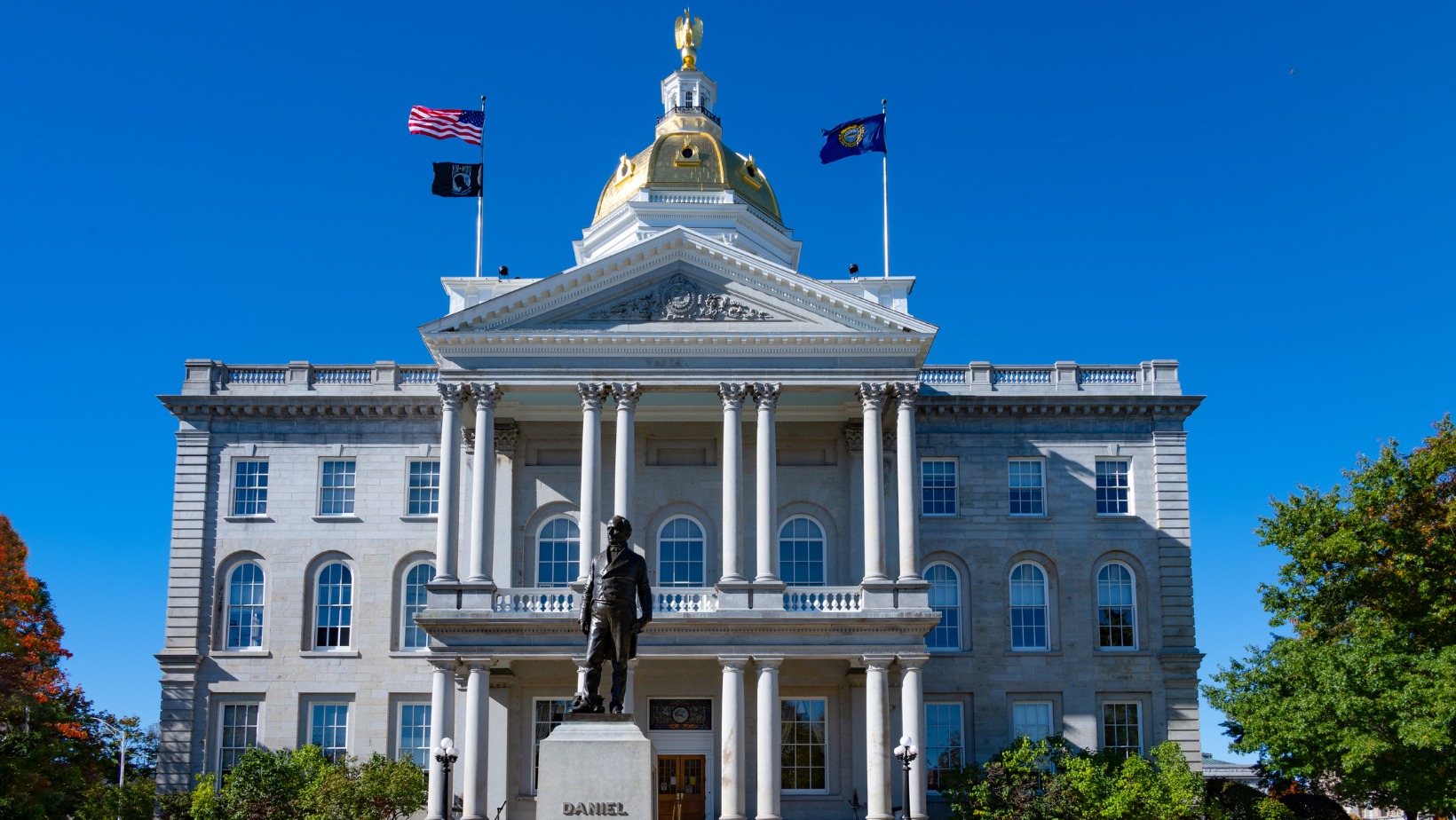
By Erin Reed | CONCORD, N.H. – In 2018, New Hampshire passed a non-discrimination law that included transgender people through an all-Republican legislature. On Wednesday, the state legislature repealed some of those protections, clarifying that such protections do not apply to bathrooms, sports, locker rooms, corrections centers, and mental health treatment centers.
The state is one of the first to roll back existing protections for transgender people and now allows for private bans of transgender people in bathrooms, locker rooms, sports, and more. The bill now heads to Governor Sununu’s desk and is the fourth anti-LGBTQ+ bill passed this year in New Hampshire.
The bill repealing protections is House Bill 396, and it was the subject of a contentious 192-184 vote earlier this year before passing the Senate yesterday. It states that though transgender people are still part of the “law against discrimination,” those protections are removed in “limited circumstances in which classification of persons based on biological sex is proper because such classification serves the compelling state interests of protecting the privacy rights and physical safety of such persons and others,” seemingly arguing that transgender people are inherently unsafe. It then outlines the specific places where discrimination against transgender people is now legal in New Hampshire:
- Bathrooms
- Locker rooms
- Athletic or sporting events
- Prisons, houses of correction, and juvenile detention centers
- Mental health hospitals
- Treatment centers
You can see the full bill here:
Importantly, the bill legalizes this kind of discrimination by private entities, meaning that all bathrooms in New Hampshire, including those run by private businesses, may exclude transgender people at the discretion of whoever is in charge of those bathrooms.
This could create a very confusing landscape for transgender people, who will have to research the policies of every private entity each time they wish to use a bathroom. Other similar bathroom bans have typically only applied to schools or public buildings. While the bill does not mandate that private entities exclude transgender people from bathrooms, it explicitly allows them to do so.
The State of New Hampshire added transgender people to its nondiscrimination law in 2018. Governor Sununu, who signed that law, stated, “Discrimination – in any form – is unacceptable and runs contrary to New Hampshire’s Live Free or Die spirit. If we really want to be the Live Free or Die state, we must ensure that New Hampshire is a place where every person, regardless of their background, has an equal and full opportunity to pursue their dreams and to make a better life for themselves and their families.”
At the time, Christian organizations criticized him for “failing to stand by Christian principles.” Shanon McGinley of the state conservative think tank Cornerstone Action said in response to the protections in 2018, “We MUST strengthen the Christian base of the NH legislature to improve our chance of winning critical votes in the next legislative session.”
It would appear that those strategies were successful. Whereas the nondiscrimination protections passed with large majorities in 2018, many of those protections were successfully reversed yesterday. Though it is unclear if Governor Sununu will sign the bill on his desk, he has recently supported anti-trans measures, such as signing a letter opposing President Biden’s Title IX protections.
New Hampshire has been a particularly rough state for transgender people this year when it comes to legislation. Just last week, the state passed three anti-trans and anti-LGBTQ+ laws, including a “Don’t Say Gay or Trans” bill, a sports ban that includes provisions for potential genital inspections, and a ban on surgery and referrals for transgender youth. Likewise, a Medicaid ban on some transgender care is currently pending a final vote in the Senate. Should all four bills be signed into law by the governor, New Hampshire will become one of the riskiest states in the Northeast for transgender people of any age.
Courtney Reed, Policy Advocate at the ACLU of New Hampshire, said of the bill’s passage, “Today is another grim day in New Hampshire. Nobody wins when we try to make discrimination law. HB 396 undermines the right to equal protection under the law for transgender people – and we urge Governor Sununu to veto this dangerous bill once it reaches his desk, keeping in tradition that the Granite State respects the rights of LGBTQ+ people.”
******************************************************************************************

Erin Reed is a transgender woman (she/her pronouns) and researcher who tracks anti-LGBTQ+ legislation around the world and helps people become better advocates for their queer family, friends, colleagues, and community. Reed also is a social media consultant and public speaker.
******************************************************************************************
The preceding article was first published at Erin In The Morning and is republished with permission.
New Hampshire
New Hampshire passes 3 anti-Trans bills in one day, more to come
New Hampshire appears poised to become one of the most risky states for transgender youth and adults in the Northeast
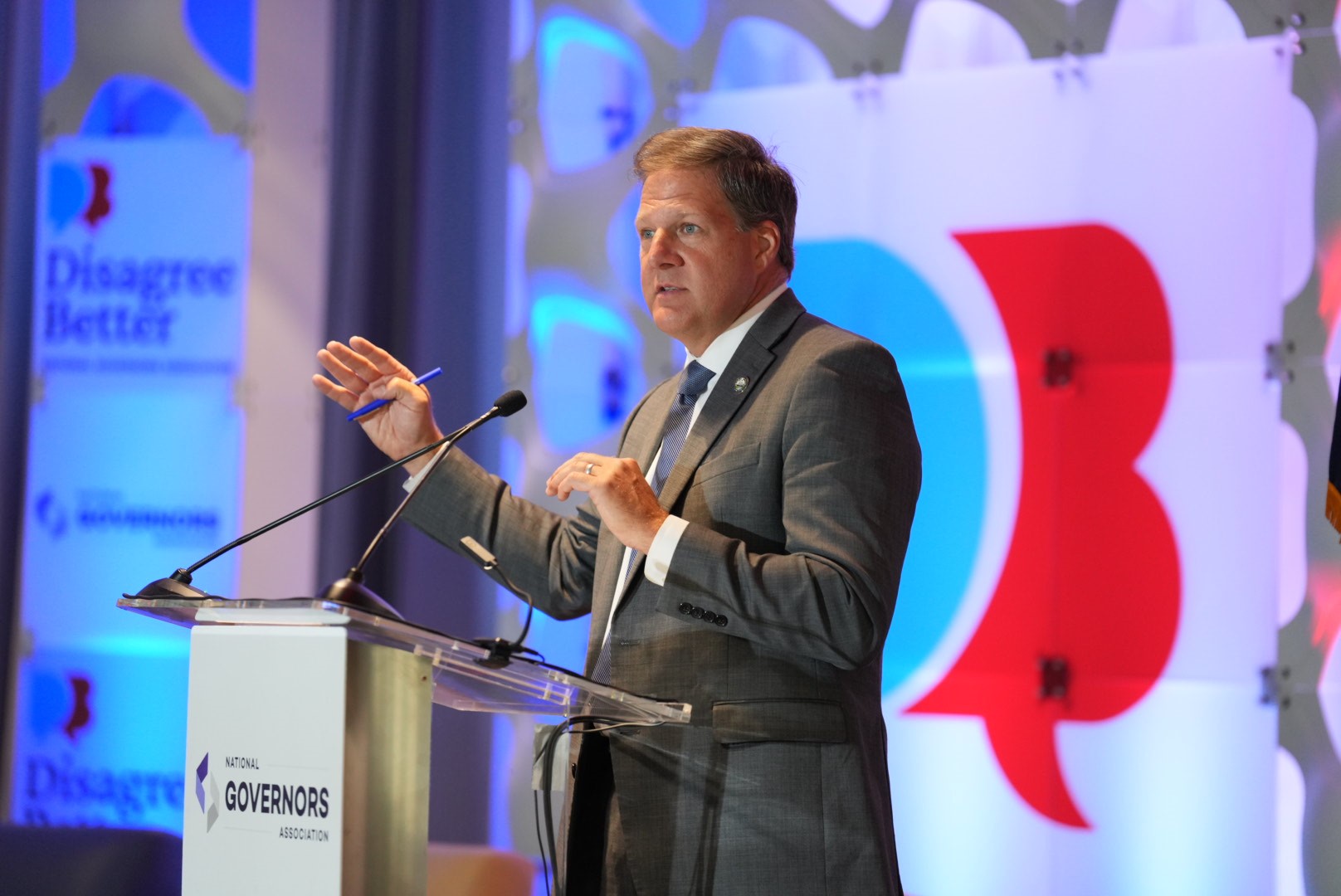
By Erin Reed | CONCORD, N.H. – On Thursday, the New Hampshire Legislature passed three separate anti-trans and anti-LGBTQ+ bills targeting transgender people in sports, schools, and medical care.
All three bills are now headed to the Governor Chris Sununu’s desk for final passage, but he has not yet indicated whether he will sign the bills. However, the governor previously joined 24 other Republican governors in a letter opposing President Biden’s Title IX rules that bar discrimination against transgender people in schools. More anti-trans bills are expected to be heard and potentially voted on next week.
Among the bills that passed were:
- House Bill 1205: This bill bars transgender youth from participating in sports that match their gender identity from grades 5-12. If a student’s “biological sex” is unclear or challenged, the law requires that “other evidence” of their assigned sex at birth be provided. This provision has been interpreted to potentially require genital inspections. Senator Ruth Ward, when confronted with these concerns, stated, “There are ways of finding out whether you’re a male or female… I would check with the coach or medical physician for the team,” which did not alleviate concerns. Similar laws have been blocked in courts in West Virginia and Ohio.
- House Bill 1312: This bill is similar to “Don’t Say Gay or Trans” legislation that has been passed in a variety of other Republican-controlled states nationwide. It defines LGBTQ+ topics as “objectionable” and requires two weeks of notice before any curriculum or course material used for instruction around sexual orientation or gender identity is introduced and could allow parents to opt their children out. Democrats argued that the bill was overly broad and could require notice for any book dealing with gender identity and sexuality, including books depicting heterosexual relationships. Similar concerns were used to dismiss a law in Iowa in court after a judge determined that merely mentioning a husband and wife could run afoul of the law.
- House Bill 619: House Bill 619 bars bottom surgery for transgender youth in the state. Although such surgeries are exceedingly rare and no evidence was presented that they are occurring in New Hampshire, the bill sets a precedent that elected officials should have a say over the healthcare decisions of individual transgender patients and their doctors. Importantly, the law also prohibits referrals out of state, which could limit options and information for transgender youth.
Two more bills are still being considered in the state and may be heard next week. House Bill 1660 would bar Medicaid coverage for any gender reassignment surgeries for those under 18, including chest masculinization or feminization surgeries. Courts have recently ruled that such bars on coverage is unconstitutional, including landmark rulings from the 4th and 11th Circuit Courts of Appeal. Also pending is House Bill 396, which could roll back discrimination protections for transgender people and would allow for discrimination in bathrooms, sports, competitions, correction centers, mental health hospitals, and more.
New Hampshire appears poised to become one of the most risky states for transgender youth and adults in the Northeast. All surrounding states have passed significant protections for transgender people, including “shield” laws that protect the privacy of patients seeking reproductive or gender-affirming healthcare across state lines. Should nondiscrimination protections be rolled back, transgender people may face a confusing landscape over such simple questions as whether they are allowed to use the bathroom as they travel through the state. Similarly, regional sporting events could be heavily impacted.
The votes in New Hampshire previously came down to the wire in the House. For every bill listed, a number of House Democrats voted yes, were marked as present not voting, or missed the vote and were recorded as absent.
Although Democrats do not hold a majority in the House, more than 12 Democrats failed to vote “no” on virtually every bill when they were heard in the House, allowing the bills to pass. Some legislators have contended that this is due to the size of the New Hampshire House, which consists of 400 members, leading to many members missing votes due to illness.
This issue seemed to affect Democrats more severely than Republicans for most votes, and even motions for reconsideration on separate days similarly failed. Notably, the “objectionable materials” bill passed by only a single vote, with 13 Democrats not voting or abstaining.
Reacting to the votes, Linds Jakows, Founder of 603 Equality, said, “Today, the so-called ‘Live Free or Die’ State sent a harmful message to LGBTQ Granite Staters, especially transgender young people, by attacking their healthcare, opportunities for inclusion at school, and access to learning about people like them. Now, Governor Sununu must clearly affirm that these bills have no place in a state that just 6 years ago, became the first entirely Republican-controlled state legislature to update its nondiscrimination law to include trangender people. In 2018 he said repeatedly that ‘it’s the right thing to do.’ Mr. Sununu, treating transgender people with dignity and respect is still the right thing to do.”
Remaining votes are scheduled for next week. Meanwhile, Governor Sununu has not indicated whether or not he will sign the bills that have passed.
******************************************************************************************

Erin Reed is a transgender woman (she/her pronouns) and researcher who tracks anti-LGBTQ+ legislation around the world and helps people become better advocates for their queer family, friends, colleagues, and community. Reed also is a social media consultant and public speaker.
******************************************************************************************
The preceding article was first published at Erin In The Morning and is republished with permission.
New Hampshire
Bill allowing parental opt-outs for LGBTQ+ school topics advances
“Parents should have these discussions with their own children- not have teachers.. This bill is for parents to have those conversations”

By Ethan Dewitt | CONCORD, N.H. – In early May, Democrats in the House defeated the “Honesty in Education Act.” The bill was the latest effort to require public school teachers to answer parents when they ask about changes to their child’s gender identity.
But another bill is moving forward that supporters say would give parents more control over their children’s instruction in schools – and opponents say would intrude on classroom instruction.
House Bill 1312 would allow parents to opt their children out of any “instruction or program of” sexual orientation, gender, gender identity, or gender expression.
Currently, state law allows parents to withdraw their children from classes related to human sexual education. HB 1312 would expand that ability to apply to the additional topics.
Under the existing process, parents must notify the school district in writing that they object to the class material. And the parents must propose alternative instruction that is agreed upon by the school district, and pay for it themselves if there is a cost.
HB 1312 would expand the withdrawal and require school district staff to notify parents at least two weeks in advance of any material that might fall into the category.
Separately, the bill would prevent school districts from requiring that teachers withhold information from parents about their child’s well-being – including information about their sexuality. Individual teachers could still choose not to answer questions from parents about their child’s sexuality, but school districts could not make it a blanket policy under the bill.
The legislation, which passed the House 186-185, appears likely to clear the Republican-led Senate, too; the Senate Education Committee voted to recommend that it pass, in a 3-1, party-line vote.
Supporters say the bill would give parents a greater say in how their children learn about sensitive topics. But opponents said the bill would empower discriminatory views against LGBTQ+ people, and that the notification process would be disruptive to teachers.
“The bill seems to be targeting, and I think stigmatizing, any instruction concerning LGBTQ+ people, and I think that this language really sends the message to LGBTQ+ students that their feelings and identities are something to be shunned, feared, potentially even censored, or not even acknowledged,” said Gilles Bissonnette, legal director of the American Civil Liberties Union of New Hampshire.
To Sen. Tim Lang, a Sanbornton Republican, the bill would encourage parents to communicate with their children about the topics – knowing that they were coming up in the curriculum – which he said could foster better connections between parents and children.
“Parents should have these discussions with their own children and not have teachers do this. This bill is the prompt for parents to have those conversations.”
Lang said the notification requirements would not prevent school districts from teaching the topics, but would rather allow parents to choose whether to participate in them. And he argued that the bill is not intended to allow parents to withdraw their child from materials that relate to LGBTQ+ people or movements in history.
“It’s just informative to parents,” he said. “Nothing stops the school from doing those classes. The class is allowed. That just says that if you do it though, because this is a sensitive topic, you need to notify parents.”
A class about Harvey Milk, the openly gay San Francisco politician who was assassinated in 1978, would not fall under the definition of instruction of sexual orientation, Lang said, because Milk was a historical figure. But any instruction directed at students themselves that delved into their own sexual orientations or gender identity – such as that in a sex education class – would need to be disclosed, he said.
But representatives of teachers unions said the bill as written does not make those distinctions clear. Teachers might interpret the law to mean that any class that discussed the history of LGBTQ+ rights would need to be noticed ahead of time, opponents said. And English teachers might feel compelled to disclose any book that featured LGBTQ+ characters, and to empower parents to prevent their children from reading those books.
“If you pass this bill that expands the areas that a parent is required notification of and can opt a child out of, where will it stop?” said Deb Howes, president of the American Federation of Teachers of New Hampshire. “… Can you study the pay gap between men and women in the same jobs in an economics class, which has to do with policies around gender discrimination?”
Lang disagreed with that characterization; books that happen to include transgender or non-heterosexual characters would not automatically invoke the disclosure requirement, he said. Only instruction that was specifically intended to teach students about sexual orientation or gender identity would need advanced notice, he said.
Brian Hawkins, director of government relations for the National Education Association of New Hampshire, argued that the topics the bill would add to the parental notification law were so broad that teachers would find the law difficult to follow.
“We think that 1312 is another piece of legislation that would significantly limit educators’ ability to teach, and provides far too many instances of vague language and framework to determine when certain actions violate the statute,” Hawkins said.
New Hampshire lawmakers first passed the law allowing parental opt-out from sex ed in 2017. In recent years, Republicans have pushed to allow more parental control over school library books, and have pressed for legislation to require teachers to answer any questions from parents about their child’s preferred pronouns or gender identity in school.
The latest parental notification bill effort, Senate Bill 341, was “indefinitely postponed” earlier this month, on a voting day when House Democrats had a majority over Republicans in the near-evenly divided chamber. That motion means that the bill is dead and that it cannot return as an amendment to another bill this legislative session.
******************************************************************************************

Ethan DeWitt is the New Hampshire Bulletin’s education reporter. Previously, he worked as the New Hampshire State House reporter for the Concord Monitor, covering the state, the Legislature, and the New Hampshire presidential primary. A Westmoreland native, Ethan started his career as the politics and health care reporter at the Keene Sentinel. Email: [email protected]
******************************************************************************************
The preceding article was previously published by the New Hampshire Bulletin and is republished with permission.
The independent, nonprofit New Hampshire Bulletin is guided by these words from our state constitution: “Government, therefore, should be open, accessible, accountable and responsive.” We will work tirelessly every day to make sure elected officials and state agencies are held to that standard.
We’re part of States Newsroom, the nation’s largest state-focused nonprofit news organization.
New Hampshire
New Hampshire Senate tables anti-trans bill
“We hope that they will uphold the same rights when they vote on HB 396, a bill that would also allow discrimination”

CONCORD, NH – The New Hampshire State Senate last week unanimously voted to table a bill that would have rolled back some of the nondiscrimination protections that outlaw discrimination against transgender people in public spaces. This effectively stops the bill from moving forward.
The bill, SB 562, would have rolled back key provisions of the 2018 law against discrimination that was updated to include transgender people and promoting the exclusion of transgender people from sports including recreational leagues, as well as restrooms. SB 562 would also subject transgender people to carceral settings where they would be more likely to face violence on the basis of their gender identity.
“In 2018, I was proud to have managed the campaign that made New Hampshire the first-ever state to pass nondiscrimination protections for transgender people in public spaces,” said Linds Jakows, founder of 603 Equality. “Today, the NH State Senate rightly took a stand against discrimination in voting down SB 562. But it’s not over yet – they must again say no to discrimination when HB 396, which is nearly identical to SB 562, comes to the State Senate floor for a vote.”
“In 2019 Governor Sununu signed a law that extended New Hampshire’s transgender-inclusive nondiscrimination protections to public schools, bolstering the rights that all public school students have to equal educational opportunities,” said Sarah Robinson, Education Justice Campaign Director with Granite State Progress. “All students, including those who are transgender, must be treated with dignity and respect as they are in order to have a safe learning environment. We thank the NH State Senate for standing up for that right today, and expect them to do the same when they vote on HB 396.”
“NH has a long and proud tradition of creating communities where every child can thrive,” said Heidi Carrington Heath, Executive Director of Seacoast Outright. “LGBTQ+ youth deserve safe schools, healthy communities, and opportunities for joy and participation just like their peers. We are thankful that today the NH State Senate stood up for their right to live free, and be fully who they are at home, at school, and every space in between. That is what it means to build a brighter future where everyone is understood, valued, and protected.”
“In 2018, a strong bipartisan majority passed a law signed by Governor Sununu to protect transgender Granite Staters from discrimination. Today, the Senate rejected a cruel bill that would have written discrimination into the law,” said Chris Erchull, Attorney at GLBTQ Legal Advocates & Defenders. “This vote affirms the New Hampshire value that everyone deserves the same opportunity to live their lives on fair terms, free from discrimination. I hope the Senate will take the same stand when they vote on a nearly identical bill, HB 396.”
“NH has protected the rights of all of its residents in the past and despite multiple threats to those rights this legislative session, we are grateful to see the NH State Senate uphold those rights by voting against SB 562,” said Grace Murray, Political Director of NH Youth Movement. “We hope that they will take the same stance and uphold the same rights when they vote on HB 396, a bill that would also allow discrimination against trans people. No person should be discriminated against based on who they are.”
New Hampshire
New Hampshire bill passes, bars trans kids from girls’ sports teams
“This bill targets a small group of student athletes claiming there is a categorical advantage when there is not”
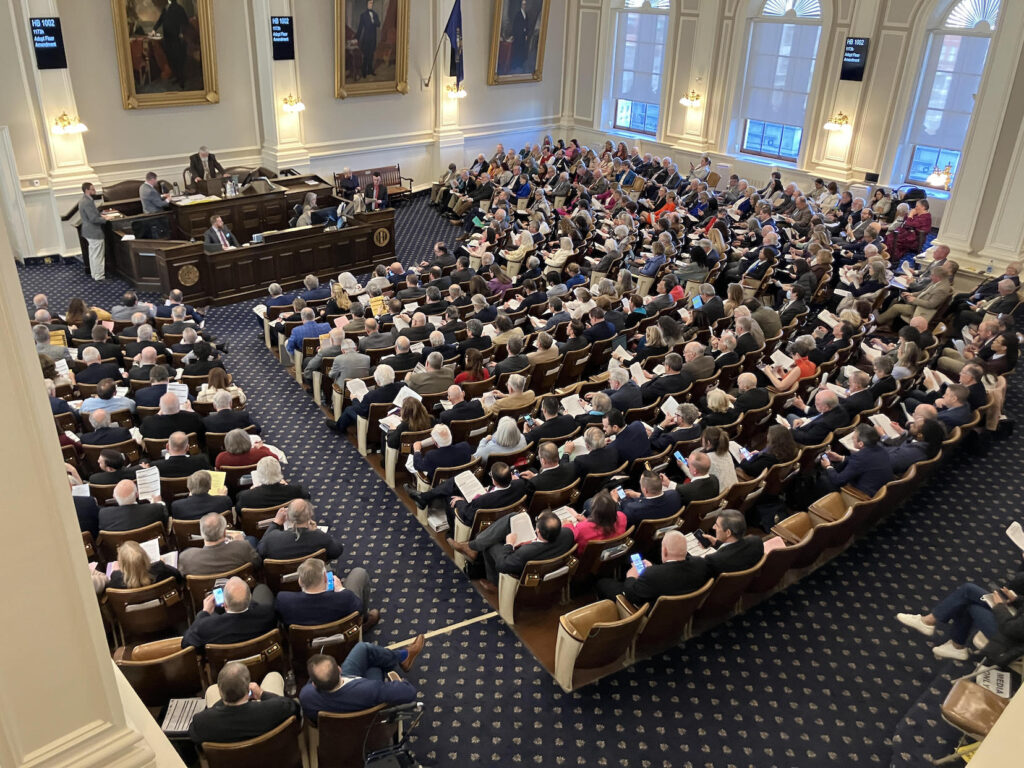
By Ethan DeWitt | CONCORD, N.H. – The New Hampshire House approved a bill to bar transgender girls from participating in female sports teams in K-12 schools and public colleges and universities, in a 189-182 vote that drew criticism from LGBTQ+ rights groups.
House Bill 1205 would require parents of students to produce a birth certificate to prove to school districts their child’s sex at birth before they could participate in a team sport. Those students whose birth certificate does not indicate their sex at birth would need to “provide other evidence” for it, according to the bill.
The bill would require all interscholastic, intercollegiate, intramural, or club athletic teams that are sponsored by a school to label themselves according to binary genders. The teams would need to be labeled into three groups: “males,” “men,” or “boys”; “females,” “women,” or “girls”; and “coed” or “mixed.” Teams designated for “females,” “women,” or “girls” would not be allowed to accept people born biologically male.
Under the bill, a student who is aggrieved by a lack of compliance with the bill could bring legal action against the school and seek damages or injunctive relief from a court, in addition to attorney’s fees. The legislation would also bar any licensing or accrediting organization, athletic association, or government entity from “entertaining” a complaint against a school on the basis of separating teams by genders, opening an investigation, or taking adverse action.
The bill would apply to grades 5 through 12.
Supporters of the bill characterized it as a women’s rights issue, and argued that trans girls and women who are born biologically male can have an unfair physiological advantage over their cisgender peers. They said the bill would uphold the spirit of Title IX, which barred sex-based discrimination in educational programs, arguing that limiting sports to cisgender women would protect the purpose of female sports teams.
But opponents denounced the bill as an attack on the rights of trans girls and women to participate in sports, and they said the bill would put schools in violation of Title IX, not in alignment with it.
“This bill targets a small group of student athletes claiming there is a categorical advantage when there is not,” said Rep. Alexis Simpson, an Exeter Democrat.
Speaking to the House Thursday, Simpson raised privacy concerns around how students who don’t have applicable birth certificates could prove their biological gender.
Simpson added that the bill could directly violate Title IX because it would bar boys from participating on girls teams, which is not allowed under Title IX. That could require schools to designate all girls teams as coed teams to avoid the potential for funding to be withdrawn, she said.
And she said the bill would violate the federal law for a more basic reason: It would bar opportunities for trans students to access the sports team of their gender identity, and Title IX prohibits sex-based exclusion.
“Title IX protects student athletes, ensuring they can participate in the sport at their school if it is offered, even if it’s not offered for their specific gender,” Simpson said. “Title IX is how girls were able to start participating in sports in the first place.”
Some rights groups, such as 603 Equality, Seacoast Outright, the American Civil Liberties Union of New Hampshire, and GLBTQ Legal Advocates and Defenders, denounced the bill’s passage.
“Today, the so-called ‘Live Free or Die’ state chose to exclude transgender girls from participating on girls sports teams, cruelly taking away opportunities to learn teamwork, improve mental health, and belong with other girls,” said Linds Jakows, founder of 603 Equality.
But Republicans argued that trans girls would not be shut out from sports and would only need to join coed or boys’ teams.
Rep. Katy Peternel, a Wolfeboro Republican, said the bill was necessary because the New Hampshire Interscholastic Athletic Association had passed a policy that allows trans students to play on sports teams. Without the bill, there was no recourse to other girls who felt it was unfair.
Peternel argued that some girls could be cut from higher teams because they are displaced by trans girls, which could affect their ability to acquire scholarships in college.
“What about the girls whose self-esteem and mental health suffers because they can’t live out their true authentic selves?” Peternel said. “These girls work hard to train and practice only to have their dreams crushed by allowing biological males to compete in women’s sports.”
For Lane, a transgender woman who requested that her last name be omitted, competing in girls sports as a transgender girl was also important to living out her authentic self.
As a fifth grader, Lane was quickly enamored with soccer, following in the footsteps of her dad, who played it in college. “It’s sort of ingrained in my DNA,” she said in an interview with the Bulletin. “I just found so much joy in doing it.”
Fifth grade was the first year Lane played soccer, at a private school in Maine. It was also the year she came out as a trans girl to her school. Her classmates and teachers were supportive, she said. And the girls’ soccer team welcomed her, too.
“I was accepted by everyone,” said Lane, who has since graduated high school. “I was seen as a girl. I went to the bathroom as a girl. … And it would be weird if there was an exception on the soccer field.”
Lane, who testified against HB 1205 earlier this year, said while she had an accepting environment growing up, other transgender students do not, and bills barring them from girls’ sports would only exacerbate that. If her school had prevented her from joining her girls’ team, she would not have played, she said.
“Sports are a huge part of upbringing,” she said. “They’re a huge part of growing up. Trans kids are kids and they shouldn’t be denied that experience because they’re trans.”
******************************************************************************************

Ethan DeWitt is the New Hampshire Bulletin’s education reporter. Previously, he worked as the New Hampshire State House reporter for the Concord Monitor, covering the state, the Legislature, and the New Hampshire presidential primary. A Westmoreland native, Ethan started his career as the politics and health care reporter at the Keene Sentinel.
Email: [email protected]
***************************************************************************************
The preceding article was previously published by the New Hampshire Bulletin and is republished with permission.
New Hampshire Bulletin is part of States Newsroom, the nation’s largest state-focused nonprofit news organization.
New Hampshire
New Hampshire official tried to ban gay art won’t run for re-election
Carrie Gendreau told the Boston Globe “homosexuality is an abomination” and says she believes rainbows are demonic

By Rob Salerno | LITTLETON, N.H. – The Littleton, New Hampshire town councilor who led a drive to ban all public art after a group installed rainbow-themed murals on the side of a restaurant is not running for re-election, after failing to file papers by the Feb 2 deadline.
Carrie Gendreau, who told the Boston Globe “homosexuality is an abomination” and has repeated the theories of doomsday cultist Jonathan Cahn, who believes that rainbows are demonic symbols that empower the Mesopotamian goddess Ishtar, who wants to subjugate Christians. She has served on the Littleton Board of Selectmen since 2018.
Gendreau also currently serves in the New Hampshire Senate, representing District 1, and is up for reelection in November. She has not responded to questions from the Blade or other outlets about whether she intends to run again. Gendreau beat her Democratic opponent 55-45 in 2022, her first election.
New Hampshire has one of the most closely divided state legislatures in the country and will be a closely watched battleground in November.
Last fall, the Littleton Board moved to ban all public art, after North Country Pride and the United Way installed a series of small murals that were meant to celebrate diversity. The board had initially wanted to ban only LGBTQ-themed art but was told that would run afoul of the first amendment right to free speech.
The board had also moved to punish the local theatre company, which put on a production of the classic gay-themed play La Cage Aux Folles (The Birdcage). Theatre UP was told that the Board wanted the production cancelled, and that its contract with the town-owned Opera House where they mount their shows may not be renewed when it comes up in May. While the board did not make a decision, Theatre UP has responded by deciding to find or build a new venue anyway.
Theatre UP was honored for its “integrity, grace, and love” in the face of the controversy at the 19th Annual New Hampshire Theatre Alliance Awards in January, while BJ Williams took how the award for Outstanding Supporting Actor in a Community Production of a Musical for playing the flamboyantly gay butler Jacob in the show.
The homophobic attacks from Gendreau and the other board members drew intense criticism from the community, who demanded an apology at the January board meeting. Gendreau offered no apology.
Instead, in a surprise move, the town’s manager Jim Gleason resigned, citing the stress caused by the controversy, and dogged personal attacks from anti-LGBT bigots who sent him hateful messages about his late son who was gay.
The moves caught headlines across the country and around the world, most of it negative, says Kerri Harrington, one of the organizers of North Country Pride. Harrington is one of four candidates who have filed for the March 12 election to fill Gendreau’s seat.
“It’s been a rollercoaster. Personally, I think we’ve turned the corner of the shock and anger, and I’m looking forward to the future. We know our community is not what was represented by that one voice. The larger voice has been one of inclusion and moving forward and progress in many issues, not just LGBT issues. I feel like the next story about Littleton is going to be positive,” she says.
Harrington, who is married to a man, says she has been a supporter of the LGBT community since she was a child.
“I was brought up to be open minded and to fight when I can with my privilege and allyship. Two of my aunts growing up were openly lesbian. They were always part of my family. Watching their struggles and having to fight for marriage equality, it became important to me by a very young age, because these were people I love,” Harrington says. “People ask me, if you’re married to a guy, why would you be involved, and I always say, ‘Why wouldn’t I be involved in fighting people’s rights?’”
******************************************************************************************

Rob Salerno is a writer and journalist based in Los Angeles, California, and Toronto, Canada.
New Hampshire
New Hampshire town’s manager resigns over homophobic attacks
Town Manager Jim Gleason stepped down from his position, citing the hateful remarks about his late son, who was gay
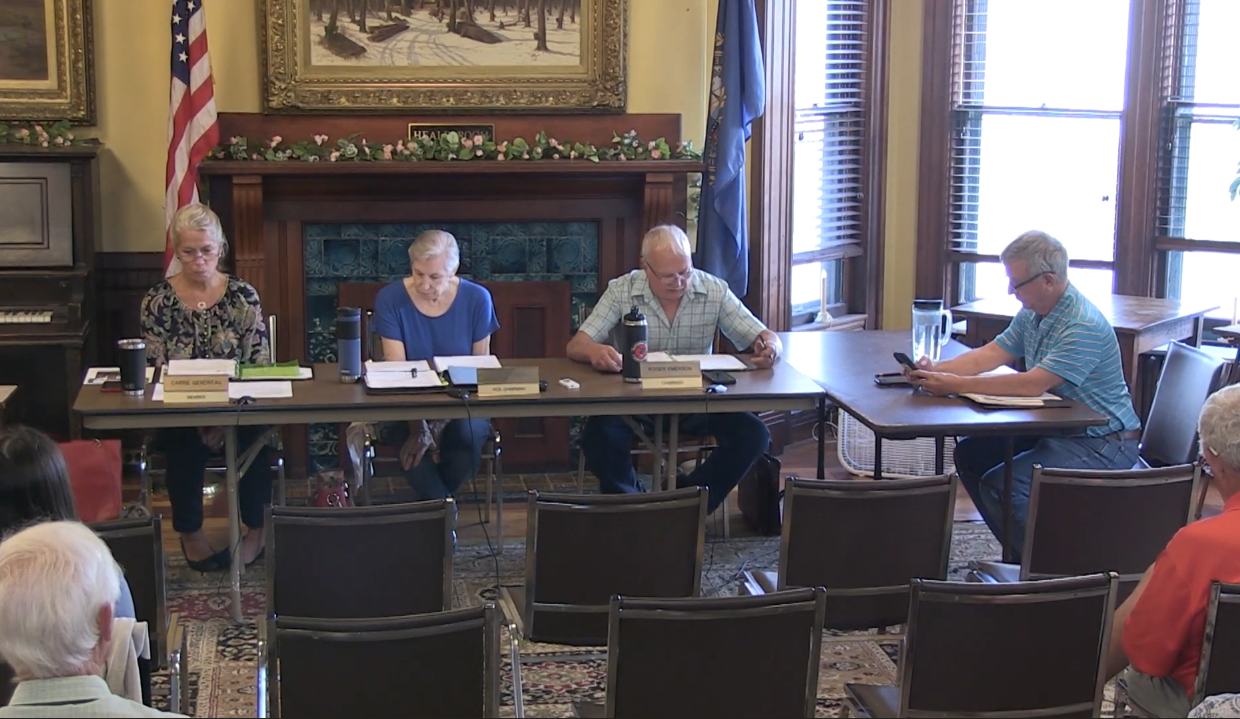
LITTLETON, N.H. – Angry residents of picturesque Littleton, New Hampshire gathered this past Monday demanding an apology for the homophobic remarks made by select board member Carrie Gendreau who called “homosexuality an abomination” and accused a local theatre company of pushing “demonic” pro-LGBTQ+ messages.
There was no apology instead the Town Manager Jim Gleason stepped down from his position, citing the pain he said he experienced during the controversy. Gleason said he has been subject to hateful remarks about his late son, who was gay.
“I’ve been here almost three years, and, yes, I’m an outsider when I came and still the guy from Florida and whatever,” Gleason said in an interview with New Hampshire Public Radio. “This is a beautiful community. There are some great people in this community that I’ve got to work with.”
This past summer, North Country Pride, which hosts an annual Pride Festival in the town, collaborated with local artists and the United Way to install the murals. While the artwork generated mostly positive feedback from the community, they led the three-person board to consider banning all public art.
Board member Carrie Gendreau, a conservative Republican who is also a state Senator, first complained about the murals at a town board meeting in August. Gendreau elaborated to The Boston Globe that she believes “homosexuality is an abomination” and explained that she follows to the writings of doomsday cultist Jonathan Cahn.
Among Cahn’s fringe theories is a belief that rainbows are demonic symbols that power the ancient Mesopotamian goddess Ishtar, who wants vengeance on Christianity for marginalizing her.
The board, which leans conservative even though the town voted nearly 50-50 Biden-Trump in 2020, wanted to ban all LGBT art, but found that there wasn’t a way they could do that without running afoul of anti-discrimination and free speech laws. So instead, the board announced they would consider banning all art in public places.
The murals aren’t the only queer art in the town board’s sights.
A local production of the classic gay musical La Cage Aux Folles in the town Opera House has also been the target of attempted censorship by the town board.
The 1983 Tony Award-winning musical by Jerry Harmon and Harvey Fierstein tells the story of a gay couple who own a drag nightclub and try to pretend to a be a straight couple when their son becomes engaged to the daughter of a conservative politician. It was adapted into the 1996 film The Birdcage.
Theatre UP President Courtney Vashaw says the company was inspired to put on La Cage after far-right protestors disrupted a drag queen story hour at the local library.
After Monday’s meeting and his resignation, Gleason told NHPR he hopes that, with his departure, the board and community will be able to move forward.
At the meeting, select board Chair Roger Emerson said the board was never planning to ban public art. Emerson and Gendreau suggested the idea could have come from Theatre UP leaders and possibly Gleason.
Gleason told NHPR he feels a review of art still places the town in a predicament.
“I will say nowhere in any email from the Board of Selectmen or in public comment did they ever use the word ‘ban,’ ” Gleason said. “But when someone says, ‘we need to do something to ensure that this art on these private buildings doesn’t make it onto public property’ – that to me is a ban. Because the board has two choices: They cannot regulate content, so they either allow it or they don’t.”
Kerri Harrington, co-chair of North Country Pride, a nonprofit that supports LGBTQ+ people in the area, told NHPR it’s been a difficult chapter for Littleton and that Monday’s meeting was a bit of a shock to not receive an apology. The meeting also closed with a reading by Gendreau, in which Harrington said people walked out on feeling upset by its contents.
“People were angry and sad, and it’s been really rough, it’s not been feeling great around here,” Herrington said. “Now we’re in a predicament because we’re not going to have a town manager.”
Additional reporting by Rob Salerno and New Hampshire Public Radio
New Hampshire
Trans-youth leaps to death off overpass in New Hampshire
Multiple sources alleged that bullying/transphobia factored into the death although the Blade has been unable to verify any of those claims

MANCHESTER, N.H. – A 14-year-old trans youth left his school, walked down Huse Road to the overpass on top of busy Interstate 293, climbed the 6 foot chain-link fence installed by the New Hampshire Department of Transportation to prevent people falling off the older bridge and its low siderails, and lept into eastbound traffic.
A spokesperson for the Rainbow Youth Project confirmed in a phone call Monday that Nova Dunn, a student at Southside Middle School, died as a result of suicide. The New Hampshire State Police while not commenting, citing an ongoing investigation, confirmed the incident and the resulting “hours-long traffic jam at the location” just east of the Mall of New Hampshire.
A friend of the family, Stacey Greenberg, wrote in the GoFundMe post to raise the funds to defray the cost of the funeral:
“Hello, this is Stacey a friend of Melissa and Mom to one of Nova’s close friends. No one should have to outlive their child but Melissa has now experienced this twice. On Wednesday afternoon, 14 year old Nova left this earth and found the peace and acceptance he was searching for.”
The New Hampshire Union Leader reported that Manchester School District Superintendent Jenn Gillis sent an email to district families Wednesday night that said in part: “It is with deep sadness that we inform you that one of our students has died unexpectedly.”
Gillis wrote that: “This loss may raise many emotions, concerns, and questions for our entire school community, especially our students.”
Manchester School District spokesperson Andrew Toland, in a press statement, noted that counselors from other Manchester area schools and the state’s Disaster Behavior Health Response Team spent Thursday at the school “directly impacted” by the death.
“Our focus in the coming days and weeks is to be supportive of our students, families and staff,” said Toland.
Multiple sources alleged that bullying and transphobia factored into the death of the teen, although the Blade has been unable to verify any of those claims.
In the past few months there has been considerable attention focused on trans-youth nationally, particularly around school policies regarding trans youth health care and gender identity. Last month, New Hampshire Public radio reported that the New Hampshire Supreme Court heard arguments in a case brought by a Manchester parent challenging school policies around transgender and nonbinary students.
The parent says she was kept in the dark when her child began using a different name and identifying as a different gender at school — something the parent objected to, NHPR reported.
At issue is a district policy that says Manchester school staff generally shouldn’t disclose when a student identifies as transgender or gender nonconforming, without that student’s permission.
New Hampshire Republican lawmakers are rallying behind legislation that would force schools to disclose a student’s gender identity to parents when asked. The House narrowly rejected one such proposal last month, but another remains on the table after passing the Senate along party lines.

In an interview on Rated LGBT Radio with Rob Watson this past week, Lance Preston, Founder and Executive Director of the Rainbow Youth Project USA, noted that the toxic legislative atmosphere had tripled calls for assistance to the RYP’s crisis counselors, as nearly 18 states have banned trans youth gender-affirming therapy for minors, and have also passed laws the forbid discussion of LGBTQ+ issues, history, and people in classrooms.
Preston also pointed out that more than a half dozen states enacting measures, like New Hampshire’s proposed disclosure of a youth’s gender to parents, in cases of non-affirming households specifically places those youth at risk for suicide or leaving, oft times ending up living homeless on the streets.
At the beginning of this month, the nation’s leading suicide prevention organization for LGBTQ+ youth, The Trevor Project, released the results of its latest survey of queer young people ages 13 to 24.
The survey of 28K youth nationwide, conducted last fall, underscores the negative mental health impact of anti-LGBTQ+ legislation and policies. Among the key findings:
- 41% of LGBTQ+ young people seriously considered attempting suicide in the past year — and those who are transgender, nonbinary, and/or people of color reported higher rates than their peers.
- 56% who wanted mental health care in the past year were not able to get it.
- LGBTQ+ young people who had access to affirming homes, schools, community events, and online spaces reported lower rates of attempting suicide compared to those who did not.
- Transgender and nonbinary young people reported lower rates of attempting suicide when all of the people they live with respected their pronouns and/or they had access to a gender-neutral bathroom at school.
- LGBTQ+ young people who experienced victimization because of their orientation or identity — including being physically threatened or harmed, discriminated against, or subjected to conversion therapy — reported more than twice the rate of attempting suicide in the past year compared to those who did not have any of these anti-LGBTQ+ experiences.
- Nearly 2 in 3 LGBTQ+ young people said that hearing about potential state or local laws banning people from discussing LGBTQ+ people at school — also known as “Don’t Say Trans or Gay” laws — negatively impacted their mental health.
Link to the GoFundMe campaign to assist the family is here: (Nova Dunn)
New Hampshire
Anti-LGBTQ student group threatening legal action at UNH Law
A spokesperson for UNH denied any allegations of discrimination, and said that the application is being reviewed

CONCORD – A Christian student group opposed to same-sex marriage, abortion and the rights of transgender people is threatening legal action after the University of New Hampshire Franklin Pierce School of Law student governing body failed to act on its petition to form its inaugural chapter at the university.
New Hampshire Public Radio (NHPR) correspondent Todd Bookman reported that the Free Exercise Coalition is an organization with the stated mission to “equip religious students in their free exercise of religion,” according to paperwork filed with the school.
Student board members of the group pledge to uphold “Judeo-Christian” religious traditions and beliefs, as well as oppose gay marriage, abortion and transgender people.
“Too often, students hide their religious beliefs in the closet,” the group says on its website. “It is becoming ever more counter-cultural to express them, and classrooms and cohorts have become less and less tolerant of such beliefs.”
The group alleges that after submitting an application in November, the UNH Law Student Bar Association “unnecessarily delayed its formal recognition and that a proposed faculty advisor for the group withdrew his support after facing pressure.”
NHPR also reported that the First Liberty Institute, a nonprofit Christian conservative legal organization based in Plano, Texas that advocates for religious freedom is representing the anti-LGBTQ Free Exercise Coalition , sent a letter to the university threatening legal action if the Student Bar Association didn’t act swiftly and approve the pending recognition.
“Rarely, if ever, has a student organization been more aptly named or, as the actions of your students and faculty make clear, needed at UNH Law,” Jeremy Dys, an attorney for First Liberty, wrote in a letter to the school.
A spokesperson for UNH denied any allegations of discrimination, and said that the application is being reviewed “under the same protocol and standard as applied to other student groups.” The university noted that students recently completed final exams, and are now on semester break.
The anti-LGBTQ group is the second Christian group to make an application. According to NHPR, the UNH Law Student Bar Association a granted recognition to the Christian Legal Society after receiving advice from the university system’s legal counsel.
That group also has a doctrine of opposing same-sex marriage and also is conflicting with the law school’s stated positions on diversity, equity and inclusion.
“You essentially have to sign a statement of faith that promotes homophobia and transphobia” to be a board member of the coalition, said Taylor Largmann, president of the campus’s chapter of the Lambda student group, which advocates for LGBTQ students. “That does not reflect UNH Law’s values. At least, I would hope not.”
UNH Law currently recognizes more than two dozen student groups, including the Women’s Law Student Association; groups for Black, Hispanic and Asian students; and groups that organize recreational outings. A photography club recently applied for membership.
New Hampshire
New Hampshire’s Republican Governor to veto “Don’t Say Gay” bill
“This bill is antithetical to all the work we have done to ensure individuals in the LGBT community can live a life free from discrimination”
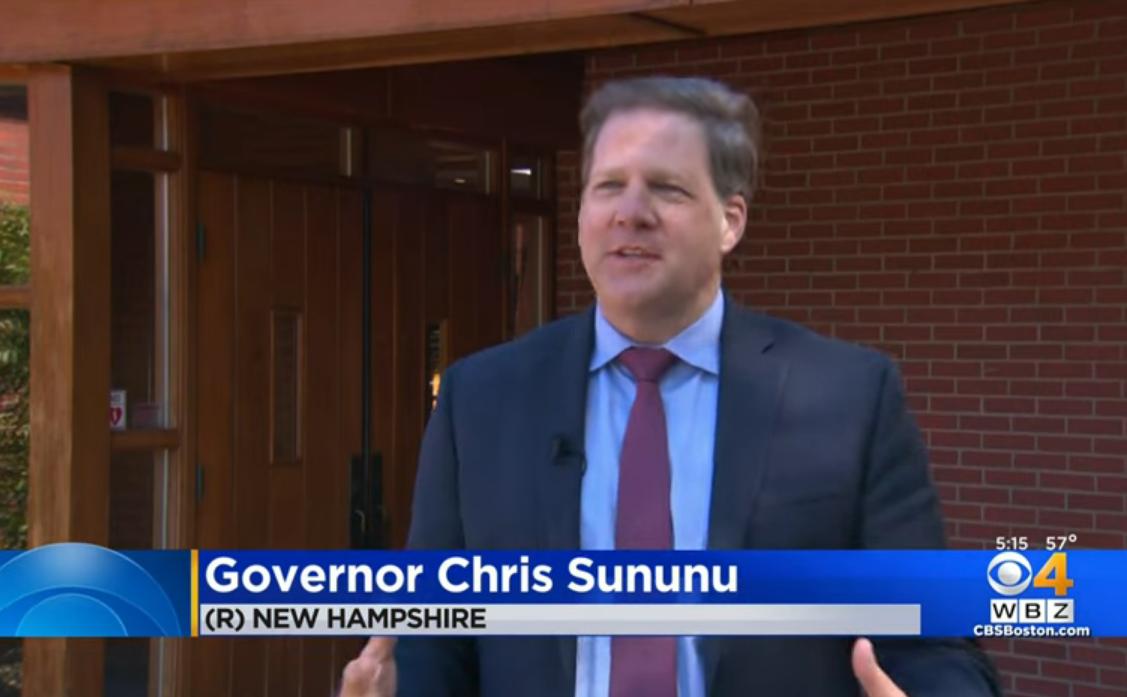
CONCORD – New Hampshire’s Republican Governor Chris Sununu announced Thursday that he will veto HB 1431, titled as the “Parental Bill of Rights,” legislation that would force school officials and faculty to take on the role of outing students to their families.
“This bill as written creates numerous challenges for kids,” the governor said. “I share the concerns of the attorney general and, as such, will veto the bill if it reaches my desk.”
The bill had undergone several changes with a final amended version working through both chambers pushed by Republican leadership.
The New Hampshire Bulletin reported Thursday that the bill has been opposed by the New Hampshire Attorney General’s Office, LGBTQ+ rights groups, civil rights advocates, and teachers unions, who noted that the legislation would require schools to “out” trans students to their parents. They argued that doing so could be dangerous for some students and might discourage others from seeking help at school.
Sununu says he will veto bill critics say would force schools to out LGBT children https://t.co/iRGeXvFNTr
— WMUR TV (@WMUR9) May 19, 2022
In interviews with Manchester’s ABC News affiliate WMUR-TV 9, supporters claimed it would allow parents to be more involved with their children’s school lives.
“They don’t know my child like I do,” said state Sen. Bill Gannon, R-Sandown. “I’m the one responsible for them. The child doesn’t have capacity on his own to give up whether or not he’s going to get certain medical treatment. I want to know what’s going on in my kid’s life.”
“So, there are a lot of cases where things are going on in a school system, and the parents are never informed, and this will allow for notification to the parents, and there’s a long list of things that would be notified – everything from bullying to failing grades,” said JR Hoell, treasurer of Rebuild NH, a group that organized around opposing COVID-19 vaccine mandates.
LGBTQ+ advocacy groups and ally lawmakers decry the measure WMUR reported:
Opponents are blasting the bill, saying it would mean that if a student joins a specific club or confides in an adviser or teacher, schools would then inform parents, essentially outing gay, lesbian and transgender students.
“This bill is antithetical to all the work we have done in the state to ensure that individuals in the LGBT community can live a life free from discrimination,” said state Sen. Becky Whitley, D-Hopkinton.
“It’s totally inappropriate for school officials to take on the role of outing students to their families, and coming out should always be an intimate moment within a family, not a clumsy event,” said Chris Erchull, of GLBTQ Legal Advocates & Defenders.
Last December a diverse group of educators, advocacy groups, and law firms filed a federal lawsuit challenging a New Hampshire classroom censorship law, contained within state budget bill HB2, which discourages public school teachers from teaching and talking about race, gender, sexual orientation, disability, and gender identity in the classroom.
“This unconstitutionally vague law disallows students from receiving the inclusive, complete education they deserve, and from having important conversations on race, gender, disability, sexual orientation, and gender identity in the classroom,” said Gilles Bissonnette, Legal Director of the ACLU of New Hampshire at the time of the lawsuit. “It is an attack on educators who are simply doing their job. Just four months into the school year, teachers are reporting being afraid to teach under this law for fear of being taken to court. This law, through vagueness and fear, erases the legacy of discrimination and lived experiences of Black and Brown people, women and girls, LGBTQ+ people, and people with disabilities.”
-

 Features3 days ago
Features3 days agoLos Angeles Blade kicks off Free Community Event Series with an informative political panel of government and advocacy group leaders
-

 a&e features5 days ago
a&e features5 days agoNo longer just a go-go dancer, Prince Joshua debuts ‘Crowned’ EP
-

 Features4 days ago
Features4 days agoFinding love in queer Los Angeles with matchmaker Daniel Cooley
-

 a&e features7 hours ago
a&e features7 hours agoMusical Mondays, a mainstay in WeHo nightlife, celebrates 16 years
-

 Arts & Entertainment4 days ago
Arts & Entertainment4 days agoLA Opera brings back Pride Night with a production of ‘Ainadamar’
-

 Noticias en Español4 days ago
Noticias en Español4 days agoINDIGNACIÓN: ¡El transfeminicidio de Sara Millerey en Colombia nos cuestiona como sociedad!
-

 Argentina4 days ago
Argentina4 days agoArgentina’s transgender community confronts ‘chaotic, desperate’ situation
-

 a&e features25 minutes ago
a&e features25 minutes agoPeppermint thrives in the spotlight

